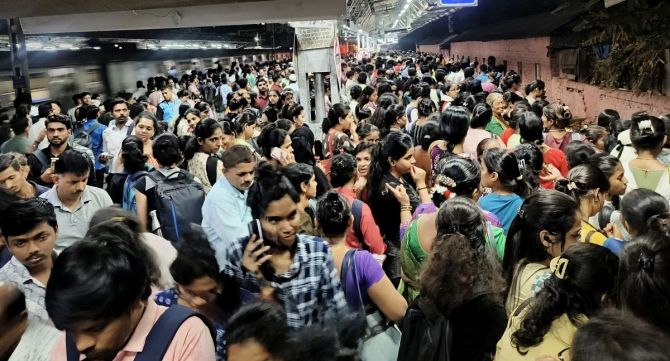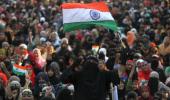Experts recommend awaiting the findings of the 2021 Census, which is yet to be conducted, before introducing population control policies.

Prime Minister Narendra Modi termed 'population explosion' a cause for concern in his first Independence Day speech from the Red Fort after leading his party to a second successive Lok Sabha win in 2019. He described those who limit the size of their family as 'patriots'.
In his annual Vijayadashami address in 2022, Rashtriya Swayamsevak Sangh chief Mohan Bhagwat cautioned about the dangers of 'religion-based population imbalance', citing examples like the creation of new countries such as South Sudan, East Timor, and Kosovo in the 21st century.
He called for the framing of a population policy.
On February 1, Finance Minister Nirmala Sitharaman, in her Interim Budget speech, announced the setting up of a high-powered committee to study the challenges of fast population growth and demographic changes.
Sitharaman said that the committee would be mandated to make comprehensive recommendations concerning the goal of 'Viksit Bharat' or a developed India.
The government has yet to announce the committee members.
However, given Modi's 2019 I-Day speech, where he emphasised the need for the Centre and state governments to collaborate through different schemes to address the population explosion, the committee could propose measures for the next two decades.
In April 2022, the Rajya Sabha discussed the Population Regulation Bill, a private members' Bill that Bharatiya Janata Party nominated member Rakesh Sinha introduced in July 2019.
Sinha demanded a revision of the National Population Policy and proposed rewarding those with small families while penalising those who don't.
According to a Parliament Library reference note from July 2022, private members' Bills proposing a two-child policy have been introduced in Parliament 35 times since Independence by Members of Parliament of various ideological hues.
Sinha's Bill suggested that a government employee who undergoes sterilisation after their second child should receive an additional increment, easier loans, land plots, and rebates on utilities, like electricity.
He argued for extending these benefits to the general public who subscribe to the two-child norm.
Sinha, a Delhi University professor and a member of the RSS, proposed that individuals with more than two children should be disqualified as elected representatives from Parliament, legislative assemblies, and local self-government.
He further suggested that those in the general public with more than two children should be denied government subsidies and benefits.
Sinha withdrew his Bill after Union Health Minister Manuskh Mandaviya's reply, stating that the government is pursuing population control through non-coercive means, including ensuring better health care.
Other members pointed out that India's total fertility rate (TFR) was now at an acceptable level.
They argued, including the BJP's Vikas Mahatme, that using force to control the population could lead to increased sex selection, female foeticide, and unsafe abortions, given the collective desire for a male child.
Arguing against coercive population control, Mandaviya stated that India's TFR declined from 2.9 in 2005 to 2.2 in 2017.
According to government surveys, 25 of 37 states and Union Territories have already achieved replacement level fertility of 2.1 or less.
However, several states, including Assam, Maharashtra, Odisha, Rajasthan, Telangana, and Andhra Pradesh, have some form of the two-child norm for those running for elected local government posts or government jobs.
In his 2021 book, The Population Myth: Islam, Family Planning, and Politics in India, former Chief Election Commissioner S Y Quraishi said that the population of Hindus has reduced from 84.1 per cent in 1951 to 79.8 per cent in 2011, while that of Muslims increased from 9.9 per cent to 14.2 per cent.
However, he argued against the provocative and exaggerated narrative that claims Muslims will overtake Hindus soon and capture political power in India.
Quraishi mentioned that it would take 600 years for Muslims to do so, given the 60 years it took to increase their population by 4 per cent.
As the National Family Health Surveys (NFHS) and Censuses until 2011 have shown, Muslims in India have adopted family planning quickly.
The data from NFHS suggests that in the past 24 years, new-generation Muslim families have excelled at family planning compared to their Hindu counterparts.
According to NFHS-1, the TFR for Muslims was 4.4, reducing to 3.6 in NFHS-2 and 3.4 in NFHS-3.
The Muslim TFR, according to NFHS-4, was 2.61, while that of Hindus was 2.13, but the former is falling at a sharper rate.
Experts recommend awaiting the findings of the 2021 Census, which is yet to be conducted, before introducing population control policies.
In his 2019 I-Day speech, Modi emphasised that if the population of India in the 21st century is 'not educated, not healthy, then neither the home nor the country can be happy', suggesting that the demographic dividend could turn into a disaster.
However, the Sangh Parivar leadership seldom talks about the increasing rate of the population growth of Muslims, stating that its concern is the growing numbers of illegal immigrants settling in border and coastal districts of India.
Cultivating India's population control and family planning landscape
INCEPTION
India launches the National Family Planning Programme (NFPP) in 1952
EVOLUTION & CHALLENGES
Department of Family Planning established in 1966, introducing 'camp approach'
National Population Policy announced in 1976
Estimated 6-8 million sterilisations carried out in 1976
BACKLASH & RENAMING
Backlash during the Emergency era, contributing to Congress' loss in 1977 Lok Sabha polls
NFPP rebranded National Family Welfare Programme
National Development Council Sub-Committee on Population established in 1992
NEW MILLENNIUM INITIATIVES
National Population Policy of 2000 aims for population stabilisation by 2045
National Rural Health Mission (2005) initiated for population stabilisation
LEADERSHIP CONCERNS
Prime Minister Narendra Modi expresses worry about 'population explosion' in his 2019 Independence Day address from Red Fort
Calls for collaboration between the Centre and states to address the issue
LEGISLATIVE ACTIONS
BJP's Rakesh Sinha introduces a population regulation Bill in the Rajya Sabha in 2019
Bill proposes penal action for those with more than two children
Debated in 2022 Budget session; Sinha withdraws Bill after health minister's intervention
STATE-LEVEL POLICIES
Uttar Pradesh government proposes population control Bill in 2021
Provisions include debarring individuals with more than two children from contesting polls -- and even denying ration
REGIONAL POLICIES & LEGAL DYNAMICS
Assam Assembly passes Population and Women Empowerment Policy in 2017
In response to a PIL by BJP leader Ashwani Kumar Upadhyay, the Centre informs Supreme Court (December 2020) against coercive forcing of family planning
Feature Presentation: Aslam Hunani/Rediff.com











